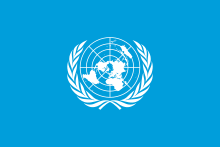
The United Nations Conference on Environment and Development (UNCED), also known as the Rio de Janeiro Conference or the Earth Summit (Portuguese: ECO92, Cúpula da Terra), was a major United Nations conference held in Rio de Janeiro from 3 to 14 June 1992.
Earth Summit was created as a means for member states to cooperate together internationally on development issues after the Cold War. Due to issues relating to sustainability being too big for individual member states to handle, Earth Summit was held as a platform for other member states to collaborate.
A key achievement of the 1992 conference was the establishment of the United Nations Framework Convention on Climate Change (UNFCCC) established in part as an international environmental treaty to combat "dangerous human interference with the climate system" and to stabilize greenhouse gas concentrations in the atmosphere. It was signed by 154 states at the United Nations Conference on Environment and Development (UNCED). By 2022, the UNFCCC had 198 parties. Its supreme decision-making body, the Conference of the Parties (COP) meets annually to assess progress in dealing with climate change.
Since the creation of the UNFCC many related environmental conferences, climate-related forums, and ongoing scientific research initiatives in the fields of sustainability, climate, and environmental security have continued to develop these intersecting issues. Non-governmental organizations (NGOs)[1] and educational institutions have been prominent participants.
The Earth Summit played an influential role in diffusing several key principles of environmental treaties, such as the precautionary principle, common but differentiated responsibilities, and the polluter pays principle.[2]
- ^ "World Conferences Introduction". www.un.org. Archived from the original on 10 March 2018. Retrieved 28 April 2018.
- ^ Morin, Jean-Frédéric; Allan, Jen; Jinnah, Sikina (2023). "The survival of the weakest: the echo of the Rio Summit principles in environmental treaties". Environmental Politics: 1–22. doi:10.1080/09644016.2023.2236505. ISSN 0964-4016. S2CID 260670633.